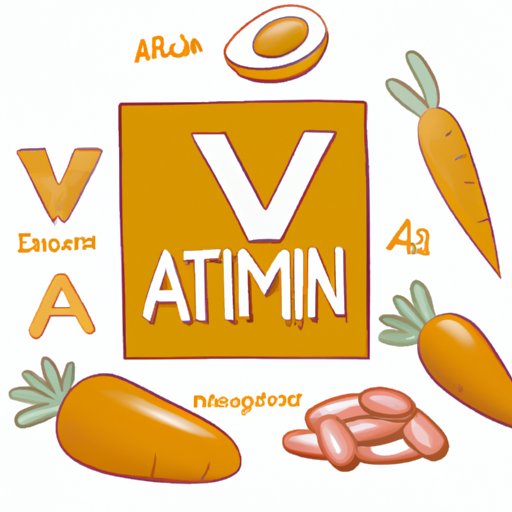
Introduction
If you are interested in learning about nutrition and the role it plays in maintaining good health, you must know about vitamin A and its importance. Vitamin A is an essential nutrient that has numerous health benefits, including vision, immune system, and cell growth. For those who want to know more about this nutrient, this article provides an in-depth exploration of the benefits, food sources, and dangers of vitamin A deficiency. Read on to discover more!
Exploring the Health Benefits of Vitamin A
Vitamin A is crucial for a variety of body functions, including maintaining healthy skin and vision, supporting the immune system, and promoting reproductive health. Studies have shown that vitamin A is essential for night vision and maintaining a healthy cornea. Additionally, vitamin A is critical for immunity as it helps produce white blood cells that fight diseases.
Top 10 Vitamin A Rich Food Sources
It is always better to get nutrients from the foods you eat. Foods that have high levels of vitamin A include sweet potatoes, eggs, dairy products, carrot, spinach, liver, cod liver oil, beef, fish and mangoes. By incorporating these foods into your diet, you can ensure that you are getting enough vitamin A.
The Role of Vitamin A in Skincare
Many people are unaware that vitamin A plays a crucial role in skincare. Vitamin A is used in various forms in skincare products because of its numerous health benefits. Some common forms include retinoids, which are beneficial in treating skin problems like acne, wrinkles, and uneven skin tone. Vitamin A derivatives like retinol are often found in anti-aging products that help improve skin texture, reduce fine lines and blemishes.
The Dangers of Vitamin A Deficiency
Vitamin A deficiency poses a significant risk to public health, particularly in developing countries. The most severe form of vitamin A deficiency is blindness. Additionally, being deficient in vitamin A can lead to a weakened immune system, making it difficult for the body to fight infections, and increases mortality in children under 5 years of age.
Should You Take a Vitamin A Supplement?
While taking a vitamin A supplement can be beneficial for certain people, it is not always necessary. The recommended daily intake of vitamin A varies, depending on age and gender. Consuming a diet rich in vitamin A is often enough to fulfill the daily requirements. For those with a deficiency or who cannot consume a diet rich in vitamin A, a supplement may be necessary. However, it is essential to consult a doctor before starting any supplement regimen.
Conclusion
Vitamin A is an essential nutrient with numerous health benefits. It is present in many foods that should be included in daily diets, including dairy, vegetables, and fruits. Additionally, vitamin A is crucial for maintaining healthy skin and vision, supporting the immune system, and promoting reproductive health. However, it is essential to understand the risks of vitamin A deficiency and seek medical advice before taking any supplements.





